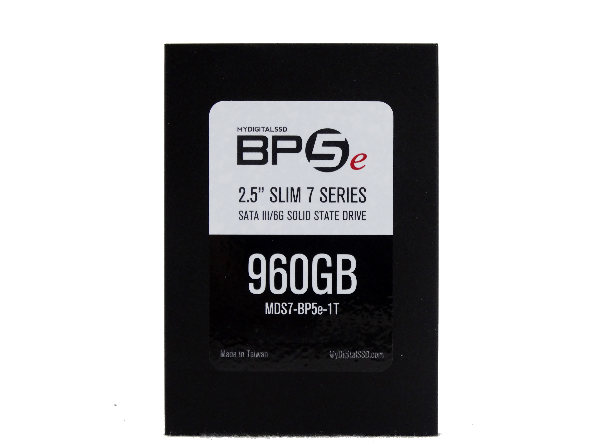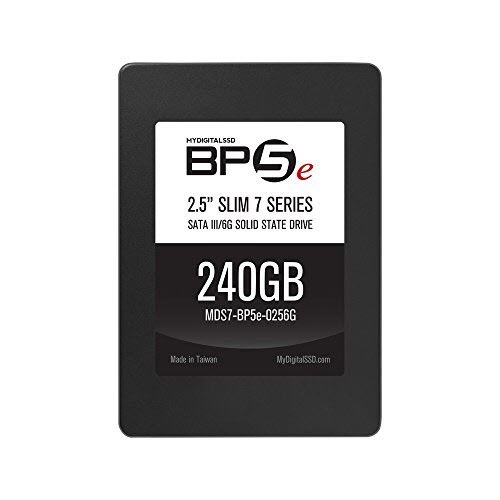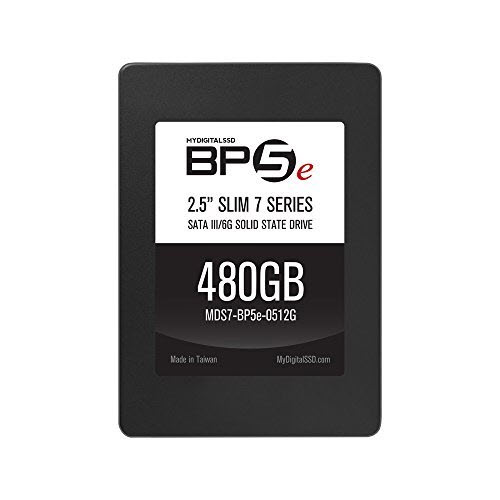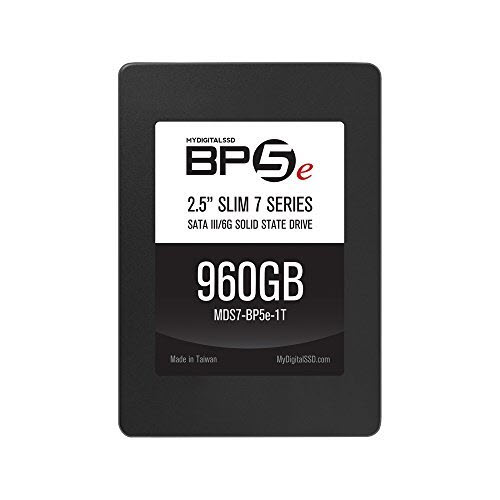Early Verdict
MyDigitalSSD's BP5e is only the second TLC-based SSD I would comfortably recommend to readers. The 850 EVO was the first. Since its release, there have been a number of TLC alternatives, but none really panned out due to low sustained write speed. No one wants to install a big game slower than you'd see from a hard drive. The BP5e fixes that issue and still manages to keep the price low.
Pros
- +
The MyDigitalSSD Bullet Proof 5 Eco is a rare TLC-based SSD that we can recommend. It undercuts the price of Samsung's 850 EVO by enough to make it a contender. We like that Phison figured out a way to double its sustained sequential write performance to reach parity with high-performance 7200 RPM mechanical hard drives, too.
Cons
- -
TLC flash has very low endurance, but advances in ECC technology have managed to ensure data integrity. We're not sure how the new firmware features will affect longevity, so enthusiasts will want to keep an eye on the WMI meter.
Why you can trust Tom's Hardware
Specifications, Pricing, Warranty And Accessories
Phison's PS3110-S10 controller is the go-to foundation for a number of new SSDs. This month I tested six drives with it, each in a different market segment. Klevv's Urbane drives are in the premium category, while Zotac's Premium Edition family is distinctly mainstream. Today, we're looking at the latest value-oriented implementation" MyDigitalSSD's BP5e.
The Bullet Proof 5 Eco (BP5e) is a low-cost Phison S10-controlled SSD that utilizes Toshiba's 15nm three-bit-per-cell flash. The flash is special because it packs more density per wafer than any other NAND on the market today. Each wafer has a fixed cost, so increasing density lowers the price per bit. Flash accounts for most of an SSD's cost, so anything you can cut from the NAND has a direct impact on pricing.
Phison's S10 controller is roughly one year old now, and it has a proven reliability record. With that requisite covered, we can look at prices and see where the BP5e stacks up. Using Newegg as a reference, we see that the 960GB model costs less than any other 1TB-class drive. At $240, the BP5e undercuts SanDisk's Ultra II by $10 and Mushkin's 1TB Reactor by $20 (the Reactor is our current favorite low-cost, 1TB-capacity-class SSD; you can see the full list here).
MyDigitalSSD is MyDigitalDiscount's house brand. The company offers several drives in difficult-to-locate form factors. It doesn't manufacture SSDs. Rather, MyDigitalSSD contracts with flash vendors to create its own branded products.
Specifications
* Tom's Hardware Performance Measurement
Previously, we published a deep dive on Phison's S10 controller with several different types of flash. If you want to know more about the processor's finer details, its technologies and features, then check out the full article. Briefly, though, the S10 was designed to work with both MLC and TLC flash. Its advanced design encompasses nearly every market segment, from the enterprise to value-oriented road warriors. Inside, four cores enable enough performance to rip through taxing workloads using MLC memory. Or, via enhanced ECC methods, it can give TLC flash a long life span. The controller's versatility is earning it popularity with SSD manufacturers that appreciate its reliability, fast time to market and support through Phison's in-house firmware division.
Like many other TLC-based SSDs, the BP5e uses an emulated SLC cache to briefly increase write performance. This helps mask TLC's native performance in most day-to-day tasks. MyDigitalSSD doesn't publish random read or write performance in its specs, so we're using our own. Of course, since we're testing the 960GB model, we have to estimate random performance for the 240 and 480GB versions. Sequential performance did come close to MyDigitalSSD's specifications, despite the fact that it uses ATTO to measure performance and we use different software. We plan to explore native TLC sequential write speeds later in the review, and we'll talk about the conditions under which you'll see performance take a hit.
Get Tom's Hardware's best news and in-depth reviews, straight to your inbox.
Pricing, Warranty And Accessories
Competition in the SATA SSD market boils down to pricing, which is where MyDigitalSSD stands out. The BP5e costs less than any other modern drive. At just $240, you get a lot of capacity at a very low price. The 480GB BP5e, at just $125, is also an exceptional value. Every time I type that price I have to make sure I wasn't looking at the 240GB model (which sells for $65). There are several other low-cost SSDs that match the lowest-capacity model's price, including Zotac's 240GB Premium Edition 240GB with MLC flash. So, the 240GB BP5e isn't as attractive as the two larger models.
All three BP5e drives include three-year warranties. When the product was first announced, MyDigitalSSD covered the BP5e with a two-year warranty. However, the company extended the warranty to three years when reviewers expressed their displeasure. Although MyDigitalSSD doesn't publish an endurance rating limit, you're not likely to exhaust the flash with normal use in the short time you're covered. The BP5e doesn't include any accessories. You get the drive in a box, sans software, manuals or adapters.
MORE: Best SSDs For The Money
MORE: Latest Storage News
MORE: Storage in the Forums
Current page: Specifications, Pricing, Warranty And Accessories
Next Page A Closer Look And Inital Performance Testing
Chris Ramseyer was a senior contributing editor for Tom's Hardware. He tested and reviewed consumer storage.
-
That price is incredible. I remember my first SSD, when it was ONLY 2$/GB. If I was buying today, I'd get 6 * 480 GB drives, and run them in a btrfs raid, just for plain storage. For anyone buying today, for their own use, it makes no sense to go mechanical.Reply
Can't wait for the next generation Samsung 3d nand. -
Nintendork It makes no sense to raid 0 SSD's, you won't improve random 4k performance AND YOU WONT IMPROVE LATENCY (wich is what it makes SSDs faster than a HDD). You're simply adding more fail %.Reply
NVMe SSD's barely improve those things. We will need intel's 3D Xpoint (or similar tech) for another massive gain in those things.
-
cryoburner ReplyFor anyone buying today, for their own use, it makes no sense to go mechanical.
The price might be relatively good for an SSD, but that's still 25 cents per gigabyte. Mechanical desktop drives, by comparison, are generally around 3 to 5 cents per gigabyte, which for someone needing multiple terabytes for bulk storage or backup redundancy can really add up. For many purposes like storing video, there won't be much of a performance difference either.
Of course, most people probably don't even need 1 TB of storage in their system, and 240 GB of storage could be more than enough for them, in which case doing away with a mechanical drive in favor of a comparably priced but lower-capacity SSD could make a lot more sense. -
CalHob Interesting to see TLC continuing to lead the value market with further refinement of error correction technique while still developing improvements in performance.Reply
As a REVIEW, it comes up short in evaluting against products in the same performance and price segment. As I started to read the review, I kept looking for Tom's Best Pick 1TB Budget Buy, the Mushkin Reactor, to be included. And, there are also other TLC based drives, that Tom's has reviewed in other capacities, that should be included. In my mind, the review should have included at a minimum: Samsung 850 EVO 1 TB (as the TLC performance reference), ADATA SP550 960GB, and Mushkin Reactor 1TB. At this point in time, the MyDigitalSSD, ADATA and Mushkin drives are competing at the same price point on Amazon and Newegg. Comparing these drives would have brought more meaning to the review. -
photonboy Nintendork,Reply
There are reasons to RAID0 an SSD. For example, working with video can benefit. Plenty of articles with number to prove that, and also to prove that for MOST things real-world benefits aren't there. -
rhysiam How likely is it that other Phison S10 drives have benefited significantly from performance-related firmware updates since release? It seems like this drive is better than the competition primarily because of the more mature firmware, but I'm wondering if other drives have also improved since release.Reply -
CRamseyer ReplyInteresting to see TLC continuing to lead the value market with further refinement of error correction technique while still developing improvements in performance.
As a REVIEW, it comes up short in evaluting against products in the same performance and price segment. As I started to read the review, I kept looking for Tom's Best Pick 1TB Budget Buy, the Mushkin Reactor, to be included. And, there are also other TLC based drives, that Tom's has reviewed in other capacities, that should be included. In my mind, the review should have included at a minimum: Samsung 850 EVO 1 TB (as the TLC performance reference), ADATA SP550 960GB, and Mushkin Reactor 1TB. At this point in time, the MyDigitalSSD, ADATA and Mushkin drives are competing at the same price point on Amazon and Newegg. Comparing these drives would have brought more meaning to the review.
When Adata released the SP550 drives for review the 960GB model was not ready. We simply do not have that drive. We built a low cost SSD performance database for each of the other capacity sizes and you see similar products grouped together in those reviews. From Computex (last June) until only recently many of the TLC-based drives were not available. In short, we're working on it.
This review was put together before the OCZ Trion 150 arrived, the two new PNY drives, the new Corsair LE and the stuff we can't talk about yet (but soon).
The Best of Monthly (what I call it) goes back to being a monthly release starting this week. Several of you read and comment on my reviews so you are here quite a bit. I plan to utilize the monthly column to recap the reviews for the month and give some insight into what to expect for the next month. I've also added several new columns. Expect to see entry-level, mainstream, and premium drives for each capacity as well as new PCIe and All-in-One RAID drives.
-
razor512 Minimal price reduction for a massive reduction in write endurance. It is a bad value unless they can reduce their price by at at least 40% (to match the data density gains that they get from TLC).Reply -
FilipHappy ReplyWhen Adata released the SP550 drives for review the 960GB model was not ready. We simply do not have that drive. We built a low cost SSD performance database for each of the other capacity sizes and you see similar products grouped together in those reviews. From Computex (last June) until only recently many of the TLC-based drives were not available. In short, we're working on it.
This review was put together before the OCZ Trion 150 arrived, the two new PNY drives, the new Corsair LE and the stuff we can't talk about yet (but soon).
The Best of Monthly (what I call it) goes back to being a monthly release starting this week. Several of you read and comment on my reviews so you are here quite a bit. I plan to utilize the monthly column to recap the reviews for the month and give some insight into what to expect for the next month. I've also added several new columns. Expect to see entry-level, mainstream, and premium drives for each capacity as well as new PCIe and All-in-One RAID drives.
Even though - good job! The review is useful and one gets a nice overall view. Thank you. :)
May I ask for your personal opinion? As a budget 1TB SSD - would you buy Mushkin Reactor 1TB, MyDigitalSSD BP5e 960GB, Adata SP550 960Gb, or wait for new releases (or wait even until june)? -
George_71 I hope "mydigitalssd" has finally gotten their stuff together. I bought a BP4e mSATA drive about a year or so ago. It failed constantly. I contacted "mydigitalssd", RMAed the drive. MDSSD replaced the drive. The replacement drive has the same issues.Reply
There is a cost/benefit that needs to be taken into account when dealing with drives. This is a low cost option,however do you really want to take the chance? I am sorry i did.



